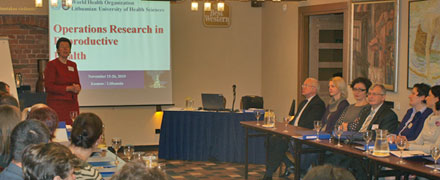Course on Operations Research, Kaunas, Lithuania, November 2010

WHO
On 15 November 2010 the third course in operations research in reproductive health started in Kaunas. The course was hosted by the Lithuanian University of Health Sciences, and this year it was organized in English in order to meet the needs of countries of central and eastern Europe where the knowledge of Russian language is limited.
20 programme managers and researchers from Albania, Latvia, Romania, Serbia and Turkey had analysed the reproductive health situation in their countries and discussed the priority areas for operational research with the national counterparts in reproductive health in the Ministries of Health.
Many of them had chosen the areas included in the Biannual Collaborative Agreements with the WHO Regional Office for Europe, and the problems identified covered a very broad range from low use of modern contraception to cervical cancer screening.
Facilitators from the Departments of Public Health and Obstetrics and Gynaecology of the Lithuanian University of Health Sciences assisted participants in developing operations research project proposals. As soon as these projects have been finalized and agreed upon with the respective Ministries of Health, they will be submitted to WHO Headquarters for expert review. If selected, implementation would be funded by the Human Reproduction Programme.
The challenges in sexual and reproductive health globally and in the European Region were presented by Gunta Lazdane, Acting Programme Manager, Sexual and Reproductive Health (including Making Pregnancy Safer) programme, to ensure that future activities are in line with the WHO Global and European Regional Reproductive Health Strategies.



